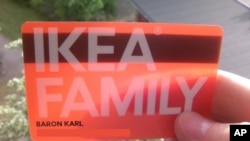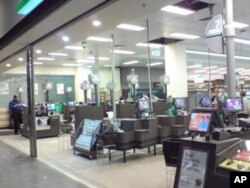The keychains that many Americans carry hold not only keys but also pocket knives, mini-flashlights, dog whistles, electronic buttons that open car doors, rabbits’ feet for luck - even cans of mace to ward off muggers.
Oh, and little plastic cards called “club cards” or “bonus cards.”
These show that you’re a club member at a grocery or department store, and thus eligible to get advertised sale prices on, say, a sports shirt or a jar of mustard. The clerk swipes your card over an electronic scanner that enters the discounted price.
But the store gets something quite valuable in return: information about you.
When you apply for your club card, you provide your address, phone number, and even your social security identity number. Every time you shop, the store’s computers match that information with a list of the things you buy.
Companies say this helps them keep customers’ favorite products in stock.
But privacy advocates hate these discount cards, because they track sensitive purchases such as pregnancy kits and because companies sometimes sell their computerized records. Yes, say the stores, but only as anonymous, mass data that disclose nothing about individual customers.
Problem is, corrupt employees have occasionally been caught selling personal records. And hackers have spectacularly intruded into databases. And lost or stolen club cards put consumers at risk.
To prove that point, a radio talk show host called a store and said she’d found a shopper card and would like to return it to its owner. She read the card number, and the company clerk blithely gave her the owner’s name and address.
So while the little cards hanging from keychains open the world of discounts to consumers, they can also reveal your secrets to the world.





